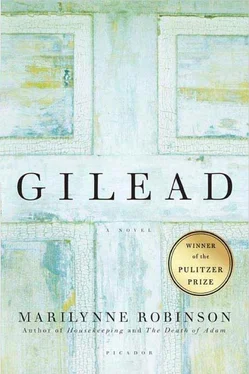I’ll tell you, if my grandfather did throw his mantle over me, so to speak, he did it long before I came into this world. The holiness of his life imputed a holiness to mine, or to my vocation, that I have tried to diminish as little as I could. I have tried to be careful of my reputation and also of my character. I have tried to keep the Gospel before me as a standard for my life and my preaching. And yet there I was trying to write a sermon, when all I really wanted to do was try to remember a young woman’s face.
If I had had this experience earlier in life, I would have been much wiser, much more compassionate. I really didn’t understand what it was that made people who came to me so indifferent to good judgment, to common sense, or why they would say “I know, I know” when I urged a little reasonableness on them, and why it meant “It doesn’t matter, I just don’t care.” That’s what the saints and the martyrs say. And I know now that it is passion that moves them to their prodigal renunciations. I might seem to be comparing something great and holy with a minor and ordinary thing, that is, love of God with mortal love. But I just don’t see them as separate things at all. If we can be divinely fed with a morsel and divinely blessed with a touch, then the terrible pleasure we find in a particular face can certainly instruct us in the nature of the very grandest love. I devoutly believe this to be true. I remember in those days loving God for the existence of love and being grateful to God for the existence of gratitude, right down in the depths of my misery. I realized many things I am at a loss to express. And of course those feelings become milder with time, which is a mercy.
Louisa and I were expected to marry almost from childhood. So nothing had prepared me to find myself thinking day and night about a complete stranger, a woman much too young, probably a married woman — that was the first time in my life I ever felt I could be snatched out of my character, my calling, my reputation, as if they could just fall away like a dry husk. I had never felt before that everything I thought I was amounted to the clothes on my back and the books on my shelves and the calendar I kept full of obligations waiting and obligations fulfilled. As I have said, it was a foretaste of death, at least of dying. And why should that seem strange? “Passion” is the word we use, after all.
Well, it got much worse. She was there every Sunday but one, and I wrote all those sermons, I confess, with the thought of pleasing her, impressing her. I struggled not to look at her too often or too long, but I would convince myself nevertheless that I saw disappointment of some kind in her face, and then I would spend the next week praying, right down on my knees, that she would give me another chance. I felt so ridiculous. But I would speak to the Lord about it just the same, asking Him to strengthen me in exercising my pastoral responsibilities, and not a word I said was true, because I was really just a foolish old man asking the Almighty to indulge his foolishness and I knew it at the time. And my prayers were answered, beyond anything I could have thought to ask. A wife, and a child. I would never have believed it.
There was the one terrible Sunday that she wasn’t there.
How dead and sad and airless that morning was, how shabby we all seemed, and the church, too. Of course my sermon that day was about welcoming the stranger because you might be welcoming “an angel unawares.” I hated reading it. I felt everyone in the room knew I was standing there making a confession of my folly. It seemed inevitable to me that she would never come back again. So I spent a dreadful week resigning myself to the smallness of my life, the drabness of it, and thanking the Lord that I had never made a complete fool of myself, had never held her by the hand at the door and attempted conversation, though I had rehearsed in my mind what I might say to her and had even written it out. It must be said also that I hated myself for a fool that I had not held her hand, had not spoken to her. I spent that week trying to make myself describe what it was that attracted me to her so strongly — somehow thinking that because I could not, the attraction would be dispelled. And I spent the week missing her as if she were the only friend I had ever had on earth. (And I also gave some thought to the practical problem of learning her name and finding out where she lived, thinking to excuse this as a pastoral concern. What humiliation.)
The next Sunday there she was again. I was miserable with relief, afraid I might laugh for no reason, afraid I might look at her too long, trying to remind myself she was a stranger, though she had been my dearest and most inward thought for weeks, and that I must not startle her with some unaccountable familiarity. I had been to the barber and I was wearing a new shirt, since it seemed only prudent to suppose that my constant, passionate, and most unworthy prayers might be answered. And I’d made a little experiment with hair tonic.
Boughton met me in the road, as he often did in those days, and he looked at me and chuckled, and I thought, What an utter and transparent fool I am.
When she left the church that day I did hold her hand and I did say a few words—”We missed you last week, it’s good to have you here again.”
“Oh,” she said, and she blushed and looked away, as if the kindness had surprised her, though it was only the most basic and routine preacherly kindness, that being all I felt I could allow myself under the circumstances.
“I am sick with love.” That’s Scripture. It makes me laugh to remember this — I turned to the Bible in my crisis, as I have always done. And the text I chose was the Song of Songs! I might have learned from it that such miseries as mine were beautiful in the Lord’s sight, if I had been younger and if I had known that your mother was not a married woman. As it was, the beauty of the poems just hurt my feelings.
Oh, but the next week I held her hand and I told her we had a Bible study that met on Sunday night and she would be most welcome. Then I went home and prayed that my wiliness would be rewarded, and shaved again, and tried to read until evening. I walked up early to the church, and there she was, waiting for me by the steps, hoping she might have a word with me. At that point I began to suspect, as I have from time to time, that grace has a grand laughter in it. She confided to this unworthy old swain with perfume in his hair that she came to me seeking baptism.
“No one seen to it for me when I was a child,” she said. “I been feeling the lack of it.” Oh, the sad, stark purity of her look.
I said, “Well, my dear, we will take care of you,” and then, very conversationally, I asked her if she had family in the area. She shook her head and said, very softly, “I don’t have family at all.” I felt a surge of sadness for her, and still, in my wretched heart, I thanked the Lord.
So I instructed your mother in the doctrines of the faith, and in due course I did indeed baptize her, and I became happily accustomed to the sight of her, her quiet presence, and I began to give thanks that I had lived through the worst of my passion without making a ruin and a desolation of my good name, without running after her in the street, as I nearly did once when I saw her step out of the grocery store and walk away. I scared myself so badly that time I broke into a sweat. That’s how strong the impulse was. And I was sixty-seven. But I did always act consistently with my great respect for her youth and her loneliness, I can promise you that. I took great care about it. I thought it best to recruit some of the kindest older women to sit through her instruction with her, and I believe that made her shy about speaking, which I regretted very much.
Читать дальше












